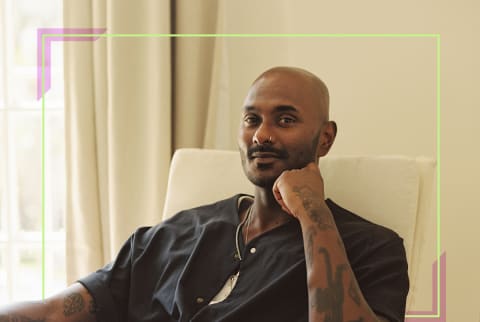In my mid-20s, I was working as a marketing director at one of the biggest banks in Australia. I would spend all day working tirelessly at my job, then stay out late partying, rarely giving my body any kind of rest. I was fairly good at what I did, but I don’t think I ever loved it. Then, about three years into my career, one question kept popping into my head: “Is there more to life than this?” But I shoved that question away and spent years operating under mounting levels of anxiety and stress until it became too much to handle. This nonstop lifestyle culminated in me having a pretty serious panic attack at work one day. I was in front of my staff, and again, I had no idea what was happening. I called the doctor, then psychologists and psychiatrists. Within the span of one week, I saw all of those practitioners, and I was prescribed different medications from each of them. One said it was ADHD; the other said stress; another said anxiety. I spent the next two years going down a rough path, and I experienced some major health issues. My anxiety symptoms got worse, I had chronic insomnia, I struggled with an eating disorder, and I developed an addiction to the prescription medication I was taking. For roughly two years, I went through a period of real suffering. During that class, the instructor (who was a Buddhist meditation teacher) spoke a lot about the mind and suffering. He shared that we are not our thoughts, and suffering wasn’t personal. I had an epiphany in that class: It was the first time I realized I had a choice when it came to my thoughts, and I didn’t have to believe every single thing that popped into my mind. Instead, I could observe those thoughts, and then do something different. Amid this realization, I knew deep down that this class was going to change my life. So I went back the next day, and the day after that, and so on. I studied with that same teacher and learned so many practices that supported my mental health and well-being. I was taught the Buddhist idea that we are not just our body or just our mind, and that concept helped me depersonalize my experience. So, it wasn’t my anxiety or my worry, it was just anxiety. I also learned a lot about impermanence and techniques to help regulate my nervous system, like breathwork. I ended up leaning more into meditation—I was drawn to it because a lot of my own suffering was related to my mind, and I wanted to understand it. After being diagnosed with ADHD, I thought meditating would be completely impossible for me. But my teacher kept assuring me that everyone’s mind gets distracted, but if you really want to understand your own mind, you have to sit and observe it. With those words ringing in my ear, I really committed myself to the practice of meditation. Buddhism was certainly the gateway for me, but it also led to learning about things like polyvagal theory1 and positive psychology. So ultimately the intersection of science and spirituality gave me solace. Within that first year, 85% of my symptoms went away. The other 15% has taken much longer—for instance, even now, if I have too much coffee, the anxiety will start to show up. But the difference is, I know how to relate to it very differently, and it isn’t something I succumb to. So, I took a pretty big leap of faith and trained to become a yoga and meditation teacher under the guidance of that very first teacher. Then after those six months back at my old job, I quit corporate life to teach yoga and meditation full time. I remember telling my family I was going to be a teacher, and they were concerned and fearful about how I would take care of myself. There were so many factors involved in this decision, but ultimately the turning point was the feeling I got—and it was just this sense of complete ease and freedom. There was no struggle, and I knew deep down this is what I should be doing. Over the next few months and into the coming years, I really started to experience transformation in my life. I started to understand my habitual patterns, tendencies, and thoughts. This awareness started to change every interaction in my life, including my relationship with my parents, daughter, and romantic partners. It completely changed my view on the world. Previously, I’d been living a very self-absorbed, self-referential life. But through my practice, I started to have more empathy for people, including people I knew, people I didn’t know, even people that hurt me, and especially myself. After my own experience, I wanted to create a space for others to benefit from the transformative impacts of meditation, as well. Then in 2015, a friend and I started a company called A—SPACE, with the goal of bringing this ancient tradition into a contemporary sphere. We hosted a few monthly pop-up workshops before we opened Australia’s first multidisciplinary drop-in meditation studio. Then in 2020, at the height of the pandemic, I was approached by one of the co-founders of Open, who wanted to merge our two companies and create an approachable mindfulness studio—so in September 2020, I moved to LA to start my next chapter of life. But then there will come a time when it feels like the right step, even if it feels really scary at the same time. Then, you have to see your vision clearly and trust your intuition.



